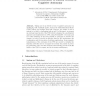Free Online Productivity Tools
i2Speak
i2Symbol
i2OCR
iTex2Img
iWeb2Print
iWeb2Shot
i2Type
iPdf2Split
iPdf2Merge
i2Bopomofo
i2Arabic
i2Style
i2Image
i2PDF
iLatex2Rtf
Sci2ools
OWLED
2007
2007
Ontology-Based Management of the Telehealth Smart Home, Dedicated to Elderly in Loss of Cognitive Autonomy
Taking care of an elderly in loss of cognitive autonomy is a challenging task. Artificial agents, such as the Telehealth Smart Home (TSH) system can facilitate that task. However, the design of such a system is, in itself, a challenging task as well. In this paper, we present an ontology-based model of the TSH, which is designed in a modularized approach and implemented in OWL using Prot´eg´e2000. Our main goal is to take advantage of the full potential of ontologies to describe the domain, in order to provide an effective base for the development, the configuration and the execution of software applications. As an example, instantiations of the ontologies of the TSH are needed to initialize the Bayesian networks used to recognize the activity the patient is probably performing. They are also involved in the learning process of the life habits of the TSH’s occupant, and in the system maintenance. Key words: Ontologies, Telehealth Smart Home, OWL, Prot´eg´e2000
Challenging Task | Cognitive Autonomy | Natural Language Processing | OWLED 2007 | Telehealth Smart Home |
| Added | 30 Oct 2010 |
| Updated | 30 Oct 2010 |
| Type | Conference |
| Year | 2007 |
| Where | OWLED |
| Authors | Fatiha Latfi, Bernard Lefebvre, Céline Descheneaux |
Comments (0)

